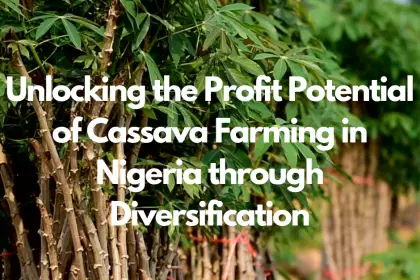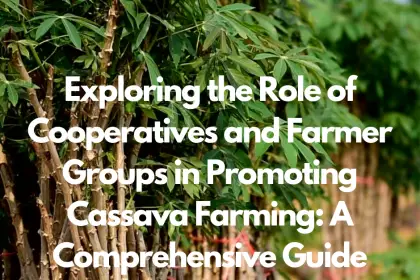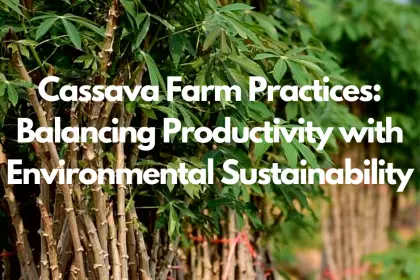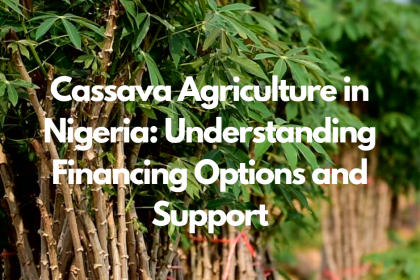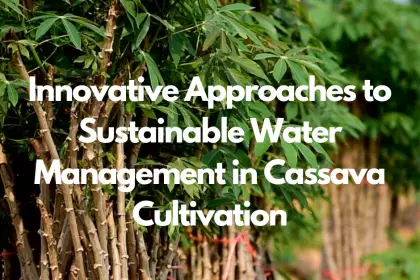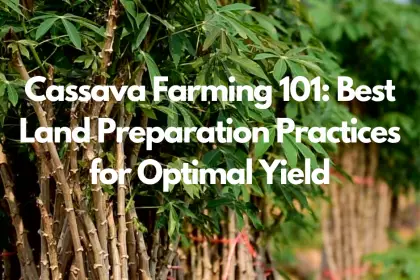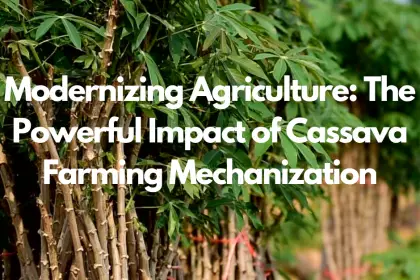Cassava stands as a cornerstone of Nigeria’s agriculture, marking our country not only as a major consumer but also as the world’s leading producer. However, the journey from farm to table is fraught with challenges, notably the crop’s short shelf-life, which results in over 40% of yields being lost before they can be processed. This not only signifies a substantial food loss but also represents a significant economic setback for our farmers and the national economy.
Addressing these challenges requires more than just hard work and perseverance; it demands financial support through grants in Nigeria. In this article, we delve into the realm of financial aid, focusing on free money grants and compiling a comprehensive list of government grants for individuals involved in cassava farming. Our goal is to guide cassava farmers through the maze of available loans and grants, highlighting eligibility criteria, application processes, and how to maximize the benefits of such financial support to turn the tide against the loss and lead to a more prosperous harvest.
Understanding Cassava Farming in Nigeria
Cassava farming in Nigeria is a significant agricultural activity that not only provides food for millions but also serves as a source of income for the majority of smallholder farmers. Understanding the dynamics of cassava farming in Nigeria requires a look into several key aspects:
- Production Scale and Challenges: Nigeria stands as the world’s largest producer of cassava, with an annual output exceeding 34 million tonnes of tuberous roots. The cultivation of cassava is primarily done by small-scale farmers, utilizing rudimentary tools on an average land holding of less than two hectares. Despite being a staple crop, cassava farming faces several challenges, including pests like green mite and cassava mealybug, diseases such as mosaic disease and bacterial blight, and systemic issues like yield loss and lack of modern processing facilities.
- Innovations and Government Initiatives:
-
- The introduction of high-yielding improved varieties and vitamin A-rich cassava are notable innovations aimed at enhancing cassava production.
- The federal government’s initiative to introduce pro-Vitamin A cassava varieties to 1.8 million farmers highlights the commitment to improving nutritional value and crop resilience.
- Efforts to increase the cropped area of cassava cultivation to 5 million hectares with a projected annual yield of 150 million tonnes by the end of 2010 demonstrate the government’s ambition to promote self-sufficiency and reduce dependency on rice and wheat imports.
- Role of Women and Economic Impact:
-
- Women play a pivotal role in cassava production, processing, and marketing, contributing about 58-67% of the total agricultural labor in key zones. This underscores the importance of gender inclusivity in agricultural policies and support programs.
- The economic impact of cassava farming is profound, with almost all of the production used for human consumption and a small fraction utilized in industries. The challenges of yield loss and the need for industrialization have led to initiatives like the IDH’s efforts to halve yield loss by 2020 and the Rockefeller Foundation’s grant to support cassava industrialization, aiming to transform wasted crops into economic gains for local farmers.
This multifaceted view of cassava farming in Nigeria highlights the critical need for continued investment in agricultural innovation, support for smallholder farmers, and policies that promote gender inclusivity and economic sustainability in the sector.
Preparation for Cassava Farming
Preparing for cassava farming involves several critical steps to ensure a successful harvest. Here’s a guide to get you started:
Land Preparation and Soil Requirements
- Soil Type: Cassava thrives in loamy or black soil. Ensure the land you select meets this criterion for optimal growth.
- Preparation Steps:
-
- Conduct thorough weeding and bush clearing.
- Plough and harrow the land to achieve loose soil, which promotes better root development.
- Apply fertilizer as needed, based on soil testing results. Soil testing can reveal pH, nutrient composition, microbial activity, and indicate the need for fertilizers or agrochemicals.
- Timing: Start land preparation during the raining season, ideally between May and October. Plant cassava stems after at least 3-4 rains have occurred to ensure the soil is sufficiently moist.
Irrigation and Planting Techniques
- Irrigation: In areas with low moisture, employ irrigation methods to maintain adequate soil moisture levels.
- Planting Methods: You can plant cassava stems horizontally, vertically, or inclined, depending on your preference and the terrain of your farm.
- Stem Selection and Planting:
-
- Use stems from plants that are 8-18 months old for planting.
- Cut stems to an appropriate length (at least a few inches long) and plant with the cut end down in the soil.
- For high root yield, plant 10,000 plants per hectare, spacing them based on the intended use: for stems or seeds, use 1 m by 0.5 m spacing; for roots, space them 1 m apart by 0.8 m.
Choosing the Right Cassava Variety
- Variety Selection: Opt for improved cassava varieties like TMS 419, Dixen, Aaya, Fine Face, or Sunshine for better yield and disease resistance.
- Source of Stems: Obtain stems of improved varieties from credible sources such as the National Seed Service (NSS), state offices of Agricultural Development Programs (ADP), the Cassava Growers Association (CGA), and reputable out-growers.
By following these guidelines, you can lay a solid foundation for your cassava farming venture, maximizing the chances of a prosperous harvest.
Overview of Loans and Grants Available in Nigeria
Navigating the landscape of loans and grants available in Nigeria for agricultural endeavors, especially cassava farming, can be a game-changer for farmers. Here, we outline key financial support systems designed to bolster the agricultural sector:
- Central Bank of Nigeria (CBN) Schemes:
-
- Agricultural Credit Guarantee Scheme Fund (ACGSF): Guarantees up to 75% of credit facilities in case of default, net of any security realized.
- Agricultural Credit Support Scheme (ACSS): Offers loans at a single-digit interest rate of 8.0 percent, aiming to lower the cost of agricultural production and generate surplus for export.
- Commercial Agriculture Credit Scheme (CACS): Provides finance at a maximum interest of 9 percent, targeting the agricultural value chain.
- Bank of Industry (BOI) and Other Financial Institutions:
-
- Agriculture Value Chain Financing (AVCF) Programme: Disbursed N3.0 billion to 22,120 smallholder farmers in 2021, aiming to improve output.
- Government Enterprise and Empowerment Programme (GEEP) Fund: Supports Nigerian SMEs in manufacturing and agro-processing sectors.
- Bank of Agriculture (BoA): Offers loans and financial support to agricultural enterprises at competitive rates.
- Specialized Programs and Grants:
-
- The Anchor Borrowers’ Programme (ABP): Targets farmers without collateral, providing farm inputs and funds at 9% interest with a maximum loan tenor of 24 months.
- Nigeria Incentive-Based Risk Sharing System for Agricultural Lending (NIRSAL): Offers Credit Risk Guarantee (CRG) and Interest Drawback Program (IDP) to encourage lending and farming efficiency.
- Agricultural Development Programs: State-specific grants and loans for farmers, including support for cassava farming.
These schemes and programs represent a robust framework designed to support cassava farmers in Nigeria, addressing financial barriers and fostering growth in the sector. By leveraging these opportunities, farmers can enhance their production capabilities, contribute to the nation’s food security, and achieve greater economic prosperity.
Eligibility Criteria for Loans and Grants
For cassava farmers in Nigeria seeking financial support through loans and grants, understanding the eligibility criteria is crucial. Here’s a breakdown of the requirements for key financial schemes:
- The Agricultural Credit Guarantee Scheme Fund (ACGSF):
-
- Eligibility: This scheme is open to eligible enterprises as defined in the Guidelines.
- Fund Size: It has a prescribed fund of N50.0 billion.
- Guarantee Cover: Offers a guarantee cover for up to 75% of any outstanding balance upon default, in respect of loans granted to the agricultural sector by banks.
- The Commercial Agriculture Credit Scheme (CACS):
-
- Target Audience: Specifically designed for large-scale enterprises.
- Minimum Asset Requirement: Enterprises must have a minimum asset size of N50 million.
- Interest Rate: Provides credit facilities at a single-digit interest rate of 9%.
These schemes are part of the government’s efforts to boost agricultural productivity and sustainability. It’s essential for cassava farmers to assess their operations against these criteria to determine the best financial support route for their farming activities. By aligning with the eligibility requirements, farmers can enhance their chances of securing the necessary funds to support and grow their cassava farming ventures.
How to Apply for Cassava Farming Loans
Applying for cassava farming loans and grants in Nigeria involves a systematic approach to ensure your application stands out and meets the required criteria for approval. Here’s a step-by-step guide on how to navigate this process effectively:
- Prepare a Comprehensive Business Plan:
-
- Objective: Clearly state the purpose of your cassava farming project, including production goals, target market, and financial projections.
- Budget: Detail your financial needs, including equipment, seeds, labor, and other operational costs. This should align with the amount you’re applying for.
- Sustainability Plan: Demonstrate how your project will remain viable and profitable in the long term.
- Fulfill Application Requirements:
-
- Documentation: Gather necessary documents such as proof of Nigerian citizenship, valid farm registration, a detailed project plan, and recent financial statements.
- Application Form: Complete the loan application form accurately, providing all requested information to avoid delays.
- Building a Strong Case for Your Project:
-
- Impact: Highlight the potential positive impact of your cassava farming project on the local community, economy, and environment.
- Alignment with Funding Goals: Show how your project aligns with the goals of the funding source, whether it’s increasing agricultural productivity, enhancing food security, or promoting sustainable farming practices.
Seek Professional Guidance:
- Consult Experts: Engage with agricultural extension officers, financial advisors, and business consultants who can provide insights and advice on improving your application.
- Workshops and Seminars: Attend workshops and seminars on agricultural financing to learn more about the application process and network with industry stakeholders.
Diversify Your Funding Sources:
- Explore Multiple Options: Apply for various grants and loans to increase your chances of securing financial support. Be mindful of any exclusivity or non-compete clauses that may apply.
- State-Specific Programs: Investigate state-specific agricultural development programs that may offer additional funding opportunities for cassava farmers.
Accessing Loans under the Agricultural Credit Support Scheme (ACSS):
- Approach Your Bank: Contact your bank to inquire about loan options through ACSS, providing your business plan and necessary documentation.
- State Chapters and Committees: Utilize the respective state chapters of farmers associations and State Implementation Committees to facilitate your loan application process.
By meticulously preparing your application and leveraging available resources and networks, you can significantly enhance your chances of securing the necessary loans and grants for your cassava farming venture in Nigeria.
Top Grants for Cassava Farmers in Nigeria
In the quest for securing grants for cassava farming in Nigeria, several notable programs stand out for their commitment to agricultural development and support for farmers. Highlighted below are top grants that cater specifically to the needs of cassava farmers:
- The NextGen Cassava Project:
-
- Objective: Modernize cassava breeding institutions in Africa and accelerate the delivery of improved cassava varieties.
- Benefits: Increase in fresh root yields, improved disease resistance, and enhancement of traits preferred by smallholder farmers in sub-Saharan Africa.
- The Green Climate Fund (GCF):
-
- Focus: Provides grants for climate-related projects, emphasizing on reducing emissions and increasing resilience in agriculture.
- Financial Instruments: Offers funding in the form of grants, loans, or guarantees, based on the project’s specific needs.
- Specialized Grants for Nigerian Organizations:
-
- U.S. African Development and Ekiti State Government Grant: Offers $50,000 – $250,000 for Nigerian-owned organizations with a proven track record in agriculture.
- The Tony Elumelu Foundation (TEF) Entrepreneurship Programme: Provides $5,000 seed capital for African entrepreneurs with for-profit business ideas or startups in agriculture, including cassava farming.
- AYuTe Africa Challenge in Nigeria: Rewards Nigerian citizens aged 18-35 with innovative ideas in agriculture with $20,000.
- GAIN Micro Grant for Empowerment: Offers ₦3 million for Nigerians above 18 years of age with operations based in focal states.
- The Arrell Global Food Innovation Awards: Provides CAD 100,000 for individuals or groups focused on areas like nutritional security, sustainable production, and poverty reduction.
To effectively secure these grants, it’s crucial to focus on addressing the identified constraints and emphasizing the potential benefits of cassava farming for food security, income generation, and women’s empowerment. Proposed strategies include the development and rapid multiplication of improved cassava varieties, extension of improved agronomic practices, support for cassava processing prototypes, and strengthening of extension-farmer linkages. Additionally, mobilizing farmers through participatory development approaches and investing in rural infrastructure are key to enhancing cassava production and marketing.
Given the diversity and potential impact of these grants, cassava farmers are encouraged to explore these opportunities to support their farming ventures. Leveraging these financial aids can significantly contribute to the growth and sustainability of cassava farming in Nigeria, paving the way for a more prosperous agricultural sector.
Maximizing Loan and Grant Benefits
Maximizing the benefits of loans and grants for cassava farming in Nigeria requires strategic planning and execution. Here are actionable steps that can be taken to ensure that financial support yields the best possible outcomes for food production and the growth of the agrarian sector:
- Strategic Allocation and Land Use:
-
- Allocate more funding to the agrarian sector, focusing on less stringent credit conditions to make access to funds easier for small-scale farmers.
- Allot more arable land for farming purposes, ensuring that cassava farmers have the space needed to implement modern farming techniques and increase yield.
- Capacity Building and Support for Farmer Associations:
-
- Enhance the capacity of farmer associations through training and support, encouraging the growth of small-scale rural agribusinesses.
- Facilitate the sharing of knowledge and resources among cassava farmers, enabling them to adopt best practices and innovative farming technologies.
- Strengthening Institutional Support and Policy Synchronization:
-
- Increase funding for government-owned agricultural financing institutions to improve their outreach and reduce the risk associated with lending to the agricultural sector.
- Implement performance-based capacity building for Rural Financial Institutions (RFIs) to enhance their effectiveness in supporting cassava farmers.
- Synchronize agricultural and trade policies using the value chain approach to prevent systemic overproduction, ensuring that cassava production meets both domestic and international demand efficiently.
By following these steps, cassava farmers in Nigeria can maximize the benefits of loans and grants, leading to improved food production, the growth of rural agribusinesses, and a stronger, more resilient agrarian sector.
Success Stories of Cassava Farmers
Success stories of cassava farmers in Nigeria weave a narrative of resilience, innovation, and progress. These stories not only inspire but also illuminate the path for aspiring farmers and stakeholders in the agricultural sector. Here are some notable examples:
- Farmer Sally’s Journey: Starting as a casual worker in 2019, Farmer Sally now oversees a thriving 30-acre cassava farm. Her journey underscores the importance of dedication and scaling up operations to achieve significant success in cassava farming.
- Innovative Practices by Veronica Njoku: As the Vice President of Aladinma Umukabia Ogodo Multi-purpose Cooperative Society, Veronica Njoku has significantly improved her cassava yield. By adopting new farming techniques and utilizing effective fertilizers, she showcases how innovation can lead to better crop production.
- Biotech Breakthroughs with Dr. Emmanuel Okogbenin: Dr. Okogbenin, AATF director for programme development and commercialisation, has been at the forefront of applying biotechnology in cassava farming across Africa. His work emphasizes the role of science and technology in transforming cassava production, making it more disease-resistant and yielding.
- Entrepreneurial Spirit of Pastor Felix Afolabi: The founder of Afolabi Agro Divine Ventures, Pastor Felix Afolabi, has been dedicated to cassava farming since 2014. His entrepreneurial approach to agriculture highlights the potential for cassava farming to be a viable business venture.
- Economic Recession to Farming Success by Mrs. Veronica Onyepunuka (Verachuks): With an Economics degree, Mrs. Onyepunuka turned to cassava farming amidst Nigeria’s economic recession. Her story is a testament to the adaptability and resilience of Nigerians, finding opportunities in agriculture during challenging times.
- Osara Women’s Cooperative Society: The members of the Osara Women Cassava Processing Multipurpose Cooperative Society have increased their income through value addition and improved processing technology. This example illustrates the power of collective action and innovation in enhancing the value chain of cassava farming.
- Impact of the Presidential Cassava Initiative (PCI): The PCI, implemented from 2001 to 2007, led to a remarkable 19.10% increase in cassava output. Key factors contributing to this success included:
-
- Expansion in land area under cassava production, which saw cassava output increase by 81.20% for every 1% increase in land area.
- A 1% increase in fertilizer application resulted in an 8.7% increase in cassava output levels over the years.
- Agricultural mechanization played a crucial role, with a 1.90% increase in cassava output for each 1% increase in agricultural machinery.
These stories and data points collectively underscore the significant strides made in cassava farming in Nigeria. Through individual determination, community collaboration, and strategic initiatives like the PCI, cassava farming in Nigeria has witnessed transformative growth, contributing to food security and economic development.
Conclusion
Throughout this comprehensive examination of cassava farming in Nigeria, we delved into the vast possibilities and ever-present challenges within this crucial agricultural sector. From highlighting the significance of cassava as a staple crop, unveiling the dynamics of its cultivation, to exploring the avenues of financial support through loans and grants, our journey painted a picture of resilience and potential. The stories of individual successes underscore the tangible impact and transformative power of informed farming practices, innovative approaches, and strategic financial aid in overcoming the hurdles faced by cassava farmers.
The synthesis of agricultural knowledge, supportive financial mechanisms, and the celebration of cassava farming triumphs collectively serve as both a beacon and a roadmap for current and aspiring farmers. As we look forward, the impetus is on leveraging these insights to further strengthen the sector, ensure the sustainability of cassava production, and, by extension, fortify Nigeria’s agricultural landscape against the backdrop of economic challenges and food security demands. In embracing the lessons shared, the prospects of augmenting food production, bolstering economic resilience, and uplifting communities through cassava farming in Nigeria show promising horizons.
FAQs
How to Obtain Agricultural Funding in Nigeria
Q: What are the avenues for obtaining agricultural funding in Nigeria?
A: In Nigeria, agricultural funding can be accessed through various sources. The Bank of Agriculture (BoA) stands out as a significant provider, offering financial assistance and loans tailored to the needs of smallholder farmers and agribusiness entities.
Starting a Cassava Farm in Nigeria: Costs Involved
Q: What is the financial requirement to initiate a cassava farm in Nigeria?
A: To establish a cassava farm in Nigeria, the costs per hectare are as follows: acquiring farmland ranges from ₦90,000 to ₦350,000; surveying and land documentation costs between ₦90,000 and ₦190,000; and land clearing, ploughing, and harrowing require about ₦45,000.
Cassava Production Yield per Acre in Nigeria
Q: What is the yield potential of cassava per acre in Nigeria?
A: In Nigeria, an acre of cassava farm can yield between 4 to 8 metric tons (MT) of cassava, which translates to approximately 1.5 to 4 metric tons of dried cassava chips and 1.2 to 2.5 metric tons of cassava flour.
Leading Cassava Producing States in Nigeria
Q: Which states are the top producers of cassava in Nigeria?
A: The leading states in cassava production in Nigeria are Benue and Kogi in the North Central Zone, according to the International Institute of Tropical Agriculture (IITA, 2004). In the South South, cassava production is dominated by Cross River, Akwa Ibom, Rivers, and Delta states. In the South West, Ogun, Ondo, and Oyo are the frontrunners, while Enugu and Imo lead in the South East.



